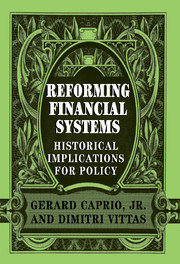Book contents
- Frontmatter
- Contents
- List of contributors
- Foreword
- 1 Financial history: Lessons of the past for reformers of the present
- 2 The evolution of central banking
- 3 Free banking: The Scottish experience as a model for emerging economies
- 4 Regulation and bank stability: Canada and the United States, 1870–1980
- 5 Deposit insurance
- 6 Contingent liability in banking: Useful policy for developing countries?
- 7 Universal banking and the financing of industrial development
- 8 Before main banks: A selective historical overview of Japan's prewar financial system
- 9 Thrift deposit institutions in Europe and the United States
- 10 The development of industrial pensions in the United States during the twentieth century
- 11 The rise of securities markets: What can government do?
- Index
Foreword
Published online by Cambridge University Press: 25 March 2010
- Frontmatter
- Contents
- List of contributors
- Foreword
- 1 Financial history: Lessons of the past for reformers of the present
- 2 The evolution of central banking
- 3 Free banking: The Scottish experience as a model for emerging economies
- 4 Regulation and bank stability: Canada and the United States, 1870–1980
- 5 Deposit insurance
- 6 Contingent liability in banking: Useful policy for developing countries?
- 7 Universal banking and the financing of industrial development
- 8 Before main banks: A selective historical overview of Japan's prewar financial system
- 9 Thrift deposit institutions in Europe and the United States
- 10 The development of industrial pensions in the United States during the twentieth century
- 11 The rise of securities markets: What can government do?
- Index
Summary
Until the early 1980s, developing country financial systems were widely regarded as passive funnels for external resources. Development banks, mostly established with the help and encouragement of the World Bank, were expected to take the lead in identifying and financing major development projects in industry and infrastructure, as well as in supporting small-scale farmers and the poor. When attention focused on the performance of development banks, it became clear that most of them were insolvent. The Bank then quickly began using commercial banks as intermediaries, but it was soon discovered that commercial banks were also mostly in financial distress.
In response to these problems, the main goal of the Bank's work in the financial sector became the task of reforming finance and putting domestic financial systems on a safe and sound footing. This initially involved rationalizing and deregulating interest rates and credit policies. The focus was then widened to a restructuring, recapitalization, and privatization of banks, followed by a stronger emphasis on capital market development. More recently, the strategy has been directed to what might be called the prerequisites of sound financial systems: better infrastructure and better plumbing, that is, better-defined property rights, more effective enforcement of contracts, improved information flows, and stronger supervision.
In refocusing the strategy, there is a wealth of historical experience from which we can draw. However, attempting to transplant institutional structures that are currently in fashion in OECD countries without sufficient regard concerning their relevance for developing countries overlooks the lessons of financial history.
- Type
- Chapter
- Information
- Reforming Financial SystemsHistorical Implications for Policy, pp. ix - xPublisher: Cambridge University PressPrint publication year: 1997



